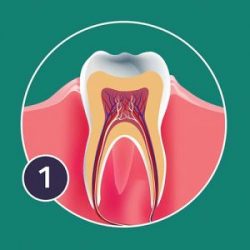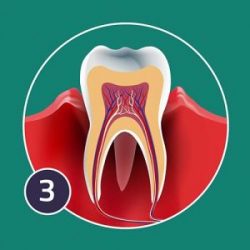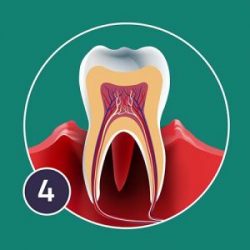Help save and protect your teeth
Gum Disease Treatment
Need emergency dental? Call (02) 8011 1066 for a same day appointment.

Gum Disease Treatment in Campsie
Our expert dental team uses gentle, effective methods to diagnose and treat gum disease, restoring the health of your gums and preserving your smile.
Don’t wait — take the first step toward healthier gums and a confident smile today.
What Is Gum Disease?
Early diagnosis and treatment are key to preserving your gums, teeth, and confident smile.

What are the symptoms of gum disease?
- Red, Swollen, or Tender Gums — Inflammation is one of the earliest signs of gum disease
- Bleeding Gums — Gums that bleed during brushing, flossing, or eating are a common indicator of gum irritation or infection
- Persistent Bad Breath (Halitosis) — Bad breath that doesn’t improve with brushing or mouthwash could signal bacterial build-up in the gums.
- Receding Gums — Gums that pull away from the teeth, making teeth appear longer, may indicate gum recession
- Sensitive Teeth — Increased tooth sensitivity, especially to hot or cold, can occur as the gums recede
- Loose or Shifting Teeth — In advanced stages, gum disease can weaken the support structures of your teeth, causing them to loosen or shift
- Pus Between Teeth and Gums — The presence of pus is a sign of infection that needs immediate attention.
- Painful Chewing — Discomfort while chewing may indicate that the gum tissues or teeth have been affected.
- Changes in Bite Alignment — If your teeth feel different when biting down, it may be due to gum damage or bone loss.
What are the causes of gum disease?
- Poor Oral Hygiene
- Smoking and Tobacco Use
- Genetics
- Hormonal Changes
- Medical Conditions
- Certain Medications
- Chronic Stress
- Poor Diet
- Misaligned Teeth or Dental Appliances
- Clenching or Grinding Teeth
What types of gum disease are there?

Gingivitis

Chronic periodontis

Aggressive periodontitis

Necrotising periodontal disease
Worried about gum disease?
Make your gums happy again with a professional diagnosis from our trusted dentists.
Your gum disease treatment
Gingivitis Treatment
Gingivitis can be treated relatively simply. The first step is a professional cleaning by your dentist or oral hygienist to remove plaque and tartar build-up. Following this, maintaining consistent oral hygiene is key to preventing recurrence. This includes:
- Brushing twice daily with a fluoride toothpaste
- Flossing daily to remove debris between teeth
- Maintaining a healthy diet low in sugar to support gum health
- With early intervention and good oral care, gingivitis is often reversible.
Periodontitis Treatment
Periodontitis requires more intensive treatment, starting with a professional clean that includes:
- Deep Scaling and Root Planing: A thorough cleaning to remove plaque, tartar, and bacteria from below the gumline and along the roots of the teeth.
In severe cases, additional treatments may be necessary, such as:
- Surgical Procedures: To remove deep-seated bacteria and repair damaged tissues.
- Soft Tissue Grafts: To regenerate lost gum tissue and protect exposed roots.
After treatment, adopting an improved oral hygiene regimen is essential to prevent recurrence. This includes regular dental visits, meticulous brushing and flossing, and a balanced diet to maintain optimal gum health.
How do I prevent gum disease?
Brush Twice Daily & Floss Daily: Use a soft-bristled toothbrush and fluoride toothpaste to brush for two minutes in the morning and before bed. Floss daily to remove plaque between teeth and along the gumline.
Regular Dental Visits: Schedule a professional clean and check-up every six months to remove tartar and catch early signs of gum disease.
Healthy Lifestyle Choices: Eat a balanced diet rich in vitamins and minerals, stay hydrated, and avoid sugary foods and drinks. Refrain from smoking or using tobacco products, as they increase your risk of gum disease.
Use Mouthwash & Manage Stress: Rinse with an antimicrobial mouthwash to reduce bacteria. Manage stress levels, as stress weakens your immune system and makes it harder to fight gum infections.
Incorporating these habits into your daily routine helps protect your gums and maintain long-term oral health.
Call us (02) 8011 1066 for personalised care and advice.